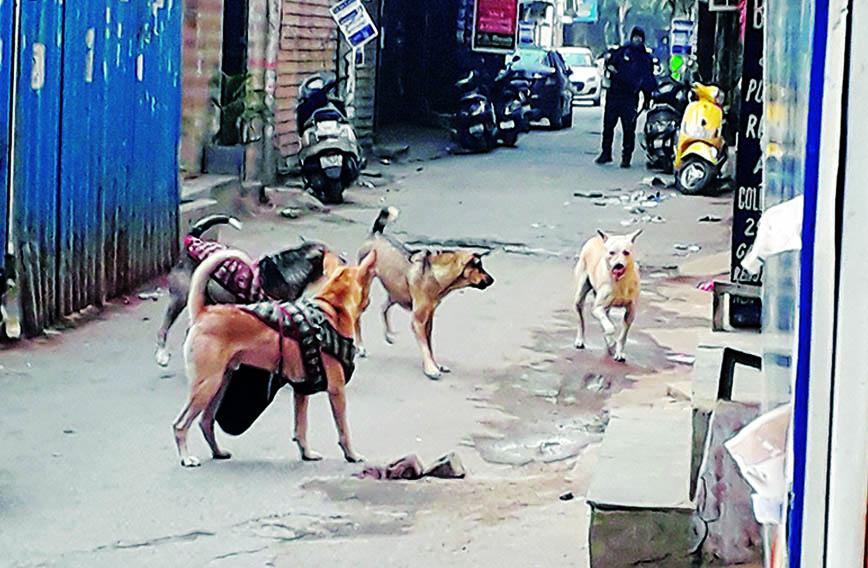
MEGHNA UNIYAL
In June 2023, an 11-year-old disabled boy in Kannur, Kerala, was mauled by a pack of stray dogs, a few hundred metres from his home. Being mute, Nihal could not cry out for help and succumbed to his horrific injuries.
In 2023, a first-year student of the National Law College, Odisha, who suffers from cerebral palsy and 65 percent disability, approached the Odisha High Court after being chased and attacked by packs of stray dogs, numerous times inside the campus, leading to acute anxiety and unstable blood pressure.
In 2024, to uphold the rights and protections for people with disabilities, the Odisha High Court directed the removal of all stray dogs from the law college premises.
In Vikash Kumar vs UPSC and Others, the Apex court held that the golden triangle of Articles 14, 19 and 21 of the Constitution apply equally to people with disabilities (PwDs) and that they must be provided additional support that helps them realize this golden triangle.
It is pertinent to note that PwDs are far more vulnerable to stray animals than able-bodied people. Visually impaired or disabled citizens use sticks which aggravate aggression in stray dogs. Often unable to see, hear or avoid being attacked by stray dogs they are far more prone to attacks, injury and death.
In 2024, a PIL was filed in the Delhi High Court by a disability rights NGO, that submitted to the court that the Animal Birth Control (ABC) rules were in violation of the Rights of Persons with Disabilities Act 2016, as they fail to address the issue of stray animal attacks in public places on differently-abled people who can't defend themselves. The Delhi High Court noted that “The city has been taken over; nowhere in the world will you find a whole city taken over by dogs and monkeys. Today it is impossible to walk on the main streets.”
The bench was scathing while addressing the issue and the activities of stray dog activists. “There is misplaced public sympathy and a notion of love for these animals. People who claim to be animal lovers are going about it in the wrong manner. Strays have taken over public parks. Can children go to play there? It is a genuine problem, and we cannot have this situation where children are bitten by stray animals and they cannot play in parks," the court observed.
The bench added, "A person with a disability also has a fundamental right to move on the main streets without the fear of being attacked by the strays. Let's not get to the other extreme that only dogs and monkeys will have a right over the city and not citizens.”
The Delhi High Court then directed the setting up of a committee to come up with specific measures to protect PwDs from stray animals. Inexplicably, the committee primarily comprised of animal rights NGO members and animal rights lawyers.
In November 2024, the Delhi state government submitted its report to the court, which included numerous short-term and long-term measures, most significantly: (a) injury and liability laws to ensure compensation in cases of attacks on vulnerable groups and holding relevant authorities accountable; (b) the creation of stray dog-free and no-stray animal feeding zones in public places; (c) the permanent removal and relocation of aggressive stray dogs.
The animal rights activist members of the committee claimed that the government’s suggestions “neither describe with clarity the roles and responsibilities of each statutory authority nor prescribe any timelines for implementation.”
This is highly disingenuous because the measures suggested by the government are already written clearly into Central Statutes like the Rights of People with Disabilities Act, State Municipal Acts and even the Prevention of Cruelty to Animals Act, all of which mandate the permanent removal of stray dogs from the streets and the maintenance of safe, obstruction-free and disease-free public places to protect the rights of citizens.
The committee instead, bizarrely, pushed for the implementation of the Dog Breeding and Marketing Rules, that have no bearing on the issue of PwDs and stray animals, and the ABC Rules -- the very rules that force the release and feeding of stray dogs on the streets and allow the maintenance of sick, dangerous and aggressive dogs, even in hospitals and educational institutions, violating Article 21 rights of citizens, especially PwDs. The High Court, however, was of the opinion that the measures were “fair and reasonable” and has directed their implementation.
Under the Rights of Persons with Disabilities Act, local authorities are mandated to remove all physical, environmental and other barriers that impair the mobility, accessibility and inclusivity of disabled citizens. The Act specifies that these measures are especially applicable in public places, educational institutions and hospitals.
In May 2025, yet another bench of the Delhi High Court directed the government to implement measures to remove all stray dogs from public places and the streets, in light of the grave dangers they pose to the public.
The recognition of the rights of PwDs and the implementation of related laws are both long overdue. With or without a court order, the Delhi state government and state governments across the country, are mandated to enforce the Rights of Persons with Disabilities Act and uphold Article 21 by ensuring safe, stray-animal free public places and streets, overriding any and all provisions of the ABC rules that violate the same. Citizens and their rights, especially the weakest and most vulnerable in society, cannot be sacrificed to absurd rules like the ABC and dangerous hobbies like stray dog feeding.
Meghna Uniyal is Director, Humane Foundation for People and Animals
Comments
Currently there are no Comments. Be first to write a comment!





